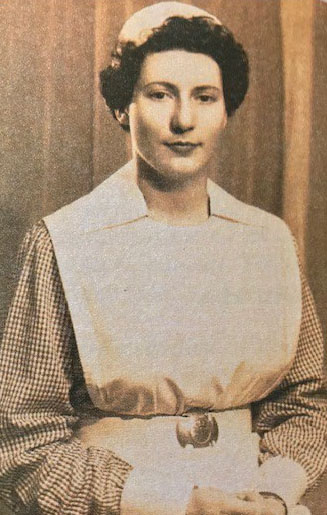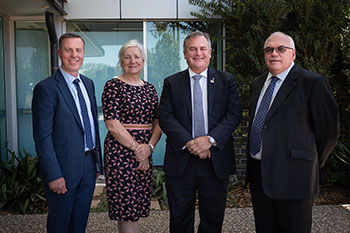The Honorary Nurse
In her twilight years, former nurse Betty Fyffe would roam her Tamworth nursing home doing what she did best.

Bettye Fyffe
“Betty declared herself the honorary nurse,” said Steve Mathews, from accountancy firm Malvern Mathews Smith, which manages her trust. “She would walk into the rooms of fellow residents, ask them how they were and proceed to take their pulse; she was always making suggestions about their health conditions. Betty was a kind, caring and compassionate nurse who took her nursing very seriously. Nursing was her passion and that strong desire to help others was ingrained in her, right until the end.”
An only child, Betty had grown up around her family’s string of chemist shops (the Cahills had five stretching from Quirindi to Tenterfield, including pharmacies in Tamworth and Armidale) but after finishing boarding school in Sydney she decided to pursue a nursing career instead, much to her father’s disappointment. She trained at St Vincent’s Hospital in the inner city and remained an enthusiastic member and supporter of its graduate nurses association until her death, in early January 2019 aged 92.
But Betty's dedication to caring for others did not finish there. The Elizabeth Cahill Fyffe Trust she established will this year begin supporting UNE medical students and rural communities—through annual scholarships and an innovative Rural Healthcare Solutions Program—in the hope that graduates will return to the country to help address significant staff shortages and inequalities in healthcare delivery.
Australian Medical Association statistics show that life expectancy in remote areas is up to seven times lower than in major cities. This creates greater pressures on the considerably smaller rural health workforce. The Australian Institute of Health and Welfare reports the number of doctors per 100,000 of the population in major cities is 437, while there were 272 in outer regional areas and only 264 in very remote areas.
Betty’s generous bequest came as no surprise to her long- time friend and fellow nurse Leslie Wright. “She’d told me about one of her visits back to Tamworth, when she saw the desperate need for medical people in country areas,” she said. “Betty really cared about the welfare of country people and described how the cities were draining the bush of medical staff. She was a great nurse and took her nursing very seriously.”
The Elizabeth Cahill Fyffe Trust will provide financial assistance for up to three years to 50 rural or regional students each year enrolled in UNE’s Joint Medical Program (Bachelor of Medical Science/Doctor of Medicine) until 2024 in what is now the university’s largest scholarship program. Dr Susan Paul, Clinical Dean of UNE’s Rural Medicine School and herself a rural GP, says the scholarships will encourage students from rural and regional Australia to attend UNE for their medical studies.
“This, in turn, will have a flow-on effect in bolstering the rural medical workforce,” she said.
“Students will appreciate the financial assistance that will help them with their costs of living expenses, while they concentrate on their studies.”
Betty really cared about the welfare of country people and described how the cities were draining the bush of medical staff. She was a great nurse and took her nursing very seriously.
The Rural Healthcare Solutions Program, to be run by UNE’s Faculty of Medicine and Health, is a more innovative concept, that aims to encourage students to take up regional medical practice. Its initial pilot project will fund residencies and placements in regional medical practices or hospitals for final-year students, coupled with online support and access to specialist advice and tuition.
Students who come from rural areas, but move away from home, are up to three times more likely to return during their working life. Professor Rod McClure, Dean of UNE’s Faculty of Medicine and Health, said the project endeavours to lift those rates for medical students and provide them with valuable hands-on experience of the
challenges and opportunities faced by health professionals on the front line of rural health care delivery. By locating students inside the community for workplace-based learning, it will give them the chance to “get a fully rounded and robust experience” of community health needs. This might, for instance, involve rotating through work with a physiotherapist, dentist, Aboriginal medical service provider, local GP and hospital staff.
“This initiative will help students to understand the full complexity of what health in a community is all about and the job satisfaction it can bring; what it really means to be a member of the healthcare provider team,” Rod said. “If they learn in this context, we think students will be more likely to become rural GPs or specialists and to become that broker between a person’s health and the system that supports their health.”
Rural Australia has higher rates of heart and lung disease, suicide and cancer, and lower access to high-tech care.

Trustees of the Elizabeth Cahill Fyffe Trust, Michael Smith and Stephen Mathews (far left and far right) join Vice-Chancellors of UNE, Professor Brigid Heywood, and University of Newcastle, Professor Alex Zelinsky AO, at the announcement of the Betty Fyffe bequest.
“Research has proven time and time again that continuity of care and trust in a service provider costs less and provides for better health outcomes,” Rod said. “Rural medicine is not a series of one-off transactions. A GP might deliver a child, watch that child grow up and support them through mental ill-health, infectious diseases and risk management during different stages in their life. Our students will get a sense of what it means to develop a sense of community and trust.”
The Rural Healthcare Solutions Program is further illustration of UNE’s commitment to meeting the needs of rural and regional Australians. “We are an anchor institution in this region,” Rod said. “Communities have identified the huge challenge of filling the required healthcare provider quotas, particularly for medical doctors. UNE is working with the community to meet that challenge and this pilot program has huge potential.”
And as for the woman who has made it all possible. “There is a beautiful synergy in the fact that someone who dedicated her life to helping others is now able to do that for a new generation after her passing,” Rod said. “Betty Fyffe is helping those people who are prepared to make a contribution in rural Australia to care for those communities of the future. That’s a wonderful legacy.”

